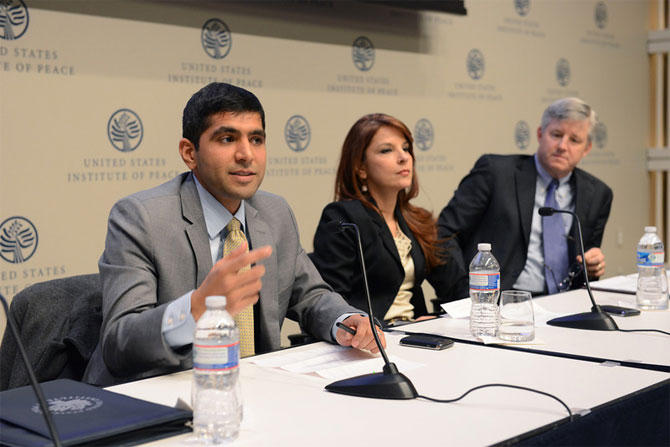Specialists on U.S.-Pakistani relations gathered at the U.S. Institute of Peace (USIP) on November 28 to examine Pakistan’s posture on the 2014 transition in Afghanistan and how strained U.S.-Pakistani ties are likely to play a role in it.

Regional specialists and senior staff from Capitol Hill who gathered at the U.S. Institute of Peace (USIP) on November 28 suggested that U.S.-Pakistani relations, following a period of significant deterioration, have improved and in the future are likely to focus more narrowly on such policy priorities as counterterrorism and nonproliferation.
The relationship, said Moeed Yusuf, USIP’s South Asia adviser, is now in “a better position than we had six months ago.” The Institute is engaged in a variety of collaborative efforts involving Pakistan: research and analytical work; consultations with policy figures in both Pakistan and the United States; the training of conflict-management facilitators within communities and among religious leaders; peace education through textbooks and teacher training; and small grants to build the capacity of youth groups and the media to counter violent extremism, among others.
The broader U.S.-Pakistani relationship is improving after tensions deepened last year. Pakistani anger arose over the U.S. raid that killed al-Qaida leader Osama bin Laden, the deaths of Pakistani soldiers in a NATO airstrike, a shooting by a U.S. contractor, and continued U.S. drone attacks on suspected militants. Meanwhile, U.S. frustrations with Pakistan grew over safe havens on its soil being used by Afghan militants, as well as perceived Pakistani reluctance to allow Taliban leaders to participate in direct Afghan reconciliation talks. Pakistan, for several months, shut down NATO supply routes to Afghanistan and took other measures to show its displeasure on the NATO airstrike that killed Pakistani soldiers in November of last year. But this week Pakistani Foreign Minister Hina Rabbani Khar told Reuters in an interview that the two countries have restored full military and intelligence ties, and he indicated that Islamabad will support an Afghan peace process.
U.S.-Pakistani tensions have inhibited the cooperation between the two countries that is needed to foster a more durable “end game” in Afghanistan as U.S. and allied forces prepare to end their combat role by the end of 2014, according to Yusuf.
Three other specialists spoke at the November 28 USIP forum, including two congressional staff members whose comments were made as individuals rather than on behalf of their committees.
Sajit Gandhi, a Democratic professional staff member on the House Committee on Foreign Affairs, noted that in comparison to early in the Obama administration there is little talk of creating a “long-term strategic partnership.” He predicted that the focus of the relationship will center on “more limited goals,” namely counterterrorism and nonproliferation. It remains critical to continue a U.S. civilian assistance program, he added. On Afghanistan, Gandhi said, “Pakistan lost the opportunity to be the point guard and help us out in the transition.” He said that Pakistan was not acting as a spoiler with respect to a successful transition in Afghanistan but was also not playing “an active role” to make it work. Gandhi said that American policymakers need to ask themselves, “How do we help Pakistan address its national security interests?”
Simbal Khan, a Pakistan scholar at the Woodrow Wilson Center in Washington and director for Afghanistan and Central Asia at the Institute of Strategic Studies in Islamabad, listed three core bilateral issues: the transition in Afghanistan, counterterrorism, and U.S. security and economic assistance to Pakistan. She described the “inherent fragility of Pakistan-U.S. relations,” in part because of the unpredictability of non-state actors like militant groups. U.S. policy toward the region continues to be “Afghan-centric,” she said, and the continuing drawdown of U.S. forces there will drive Washington’s Pakistan policy more strongly in the coming period. As political processes in Afghanistan take center stage and U.S. military operations there decline, there will be “greater space for cooperation with Pakistan,” Khan said, with some higher-level diplomatic engagement between Islamabad and Kabul already happening. A lighter U.S. military footprint in the region, including fewer drone strikes, could encourage improved security cooperation with Pakistan on counterterrorism and otherwise—what Khan termed a “narrow window of opportunity.”
Michael Phelan, a Republican professional staff member of the Senate Committee on Foreign Relations, said that a “much more sober reflection on this relationship” has taken place over the past two years. Relations in the coming years “will shift, and it’s about time,” he said. “I think we’ve lowered our expectations a bit so it will be easier to meet those expectations.” He described himself as encouraged that future ties will be more mature and built on a clearer assessment of both countries’ intentions and capabilities. Phelan called for “a true and effective partnership” in national security and economic development.